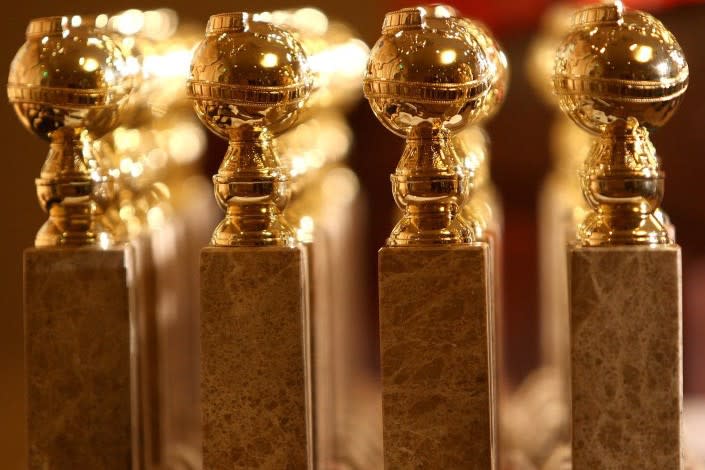Editorial: The group behind the Golden Globes needs a shakeup

At its best, the Golden Globes awards show is a romp, a chummy, gossipy version of the far more serious (and prestigious) Oscars. And even as some other awards shows drop in ratings, the Globes, which recognizes work in film and television, remains hugely popular. But the credibility of the people behind the show only seems to dwindle.
A Feb. 21 report in The Times outlined the long-checkered past of the Hollywood Foreign Press Assn., which started in 1943. The organization denied allegations in 2011 that its members took gifts from studios and producers courting them for nominations and awards. But it has acknowledged a number of other practices that are questionable.
The tiny group of 87 members work for foreign media outlets of varying distinction. By contrast, the Academy of Motion Picture Arts and Sciences, which awards the Oscars, has about 9,300 voting members, all of whom are employed in the entertainment industry. And as media outlets have shrunk, so have the HFPA members’ opportunities to work.
While the HFPA currently has more women than men, and not all are white, it has no Black members. (Members say none have applied in recent times.)
Over the years, the association has been mocked for its goofball choices of Globe winners. In recent years, though, the HFPA has tried to clean up its act and, smartly, allowed itself to be flogged even by hosts of the Globes telecast.
The association, a nonprofit, earns much of its revenue from selling the broadcast rights to its awards show; its deal with NBC (a corporate sibling of Universal Studios) earned the HFPA $27 million last fiscal year. The money has funded tens of millions of dollars in philanthropic grants over the years to, among others, programs and educational institutions that help train and develop filmmakers, writers, designers and journalists. In 2020, the grants totaled about $5 million.
But it also spends a chunk of the money it collects from Hollywood on itself, and herein lies the credibility problem. It pays its members to sit on its numerous committees — it spent about $1.9 million that way in the fiscal year ending June 2020, according to The Times' report. Members insist they work hard on committees. The Academy of Motion Picture Arts and Sciences, on the other hand, pays none of its members to sit on committees.
Granted, HFPA members are earning less from their work as writers and photographers as journalistic outlets across the globe cut back on staff and rarely have full-time entertainment reporters based in Los Angeles. Some members may be taking in more money from their committee work than from their journalism. That’s unfortunate, but there is something unseemly about journalists who cover Hollywood jockeying for assignments to HFPA committees that maintain their association. Bottom line, they are using funds from Hollywood on themselves. That's squandering journalistic integrity.
If necessary, the HFPA needs to hire more professional staff to do time-consuming committee work. Some members get involved, as part of the HFPA’s grants committee, with visiting school grantees, talking to students, and moderating panels for them. That’s great. They just shouldn’t be paid for it.
The HFPA pays members’ airfare when they fly to interview people or visit sets, but it allows studios to pay for hotel rooms and dinners. Letting studios cover those bills presents a clear conflict of interest and breaks a credo of responsible journalistic outlets. But it's still a problem when the HFPA picks up members' journalistic expenses. Offering freelancers help in emergencies is one thing; routinely funneling revenues earned from Hollywood to HFPA members is another.
And the idea that the HFPA can’t find any Black journalists covering entertainment for a foreign media outlet seems hard to believe in 2021. The HFPA should be more aggressive about diversifying its ranks. (And it could stop seeing itself as a little club. Why exclude any journalists covering TV and film for credible foreign outlets?) The HFPA funds numerous organizations and schools that are working to diversify the aspiring talent pool for the entertainment industry. Why not find a program — or help create one — that develops a diverse group of arts and culture journalists? If there is such a dearth of Black entertainment journalists in the world, then help grow them.
The HFPA is never going to correct the bad optics of being a journalists' organization that gets paid by a TV network to put on a show that gives awards to movies and TV shows. But it could make a lot of changes that would help make it more credible.
This story originally appeared in Los Angeles Times.

